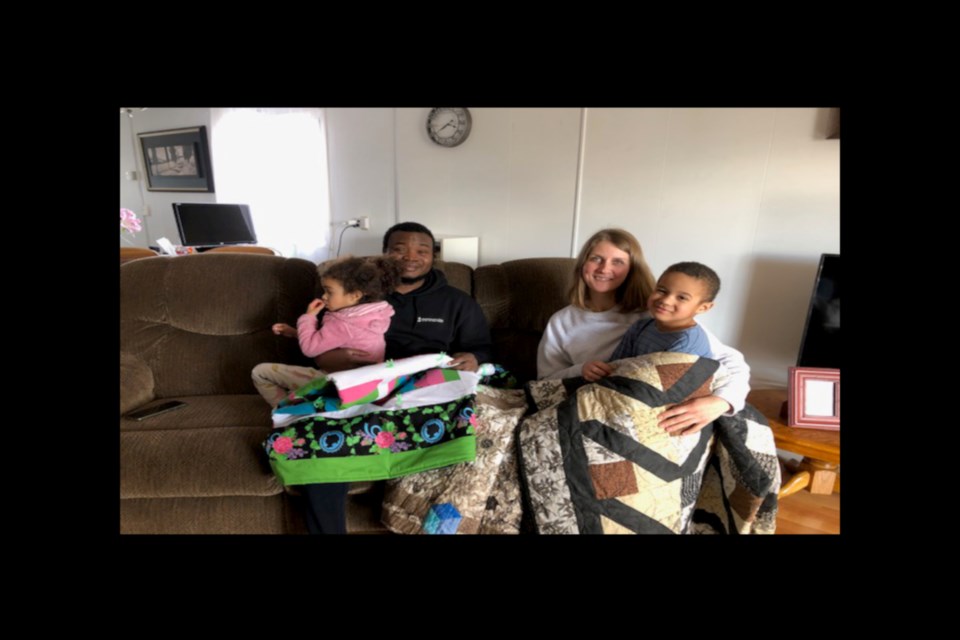ATHABASCA — They have made quilts for years, for people impacted by fire, flood, cancer and now for Ukrainian refugees.
Quilting For Humanity Society (QFHS) volunteers have been busy making quilts to be given to Ukrainians relocating to the region, preparing warm welcomes for refugee families to wrap up in.
“Individuals began at the four-day March sewing session and continued at the next monthly session which wound up April 7 at the organization's workshop in the Legion basement,” QFHS secretary Janice Green said in an April 7 e-mail. “While existing QFHS members were encouraged to invite a friend to attend with them to help the group in their April endeavours, president Yvonne Doroshenko worried that the anticipated total production goal of at least 100 quilts might not be achieved, so she posted to a provincial message board for individual quilters to consider volunteering.”
Former Athabasca resident Phyllis Pitz showed up at the Athabasca Legion April 4 armed with 38 quilts from her Airdrie quilting guild and stayed long enough to help finish some quilts already started by QFHS members, and 11 quilts were sent Tuesday to St. Albert in preparation for three families from Ukraine, the first of which arrived April 4.
“We've got the one that arrived on Monday, a family of four, and then the other two families will most likely be coming within the next few weeks,” said Fran van Bruggen in an April 7 interview.
van Bruggen and her husband had lived in Ukraine for three years doing missionary work for the Church of Latter-Day Saints and met the three families coming over during that time. It was also their first experience with Russia invading another country.
“We were there when Russia took over Crimea back in 2014 and that really affected the area where we were living because we were serving in a missionary capacity, and we were in charge of some young missionaries and some of them were down in Crimea,” she said. “We had to evacuate them out of there and then the whole thing happened in the east, and we had refugees coming out of the east — Donetsk, Donbass area.”
So, when Russia attacked Ukraine Feb. 24 of this year they started reaching out to the friends they had made.
“We weren't hearing from them for a while, but then they finally texted us to tell us that they've gotten out of Ukraine and into Germany and Luxembourg, and these different places,” said van Bruggen.
She said the families were traumatized by the events, so they offered to help get them to Canada, a long process even if the Canadian government has sped up the processing of Ukrainian refugee applications.
“Some things have been sped up but there are other things that are still challenging,” she said, noting even after having their applications accepted by Canada Immigration the families had to travel a significant distance for biometric testing — one to the Hague in the Netherlands, and two others to Paris.
Then they must mail their passports to another country, in this case it was Austria, and wait for the passports to be returned with the visa in it that allows them entry to Canada.
“So, from start to finish, the first family that arrived on Monday took about two-and-a-half, three weeks, for all of this to happen,” said van Bruggen. “The second family is in the waiting-for-approval stage and then the third family is just doing their biometric testing now or later this week.”
In the meantime, the van Bruggen’s spread the word they would need a home for the first family as well as household items, so friends and family stepped up providing everything, even a car for the Oloruntegbe family who arrived last Monday, and the process will be repeated for the next two families.
“We have some friends who created a really nice donation form that we could share with our friends and part of it is the household goods and the clothes and everything that people can click on and reserve it and say, ‘Okay, I'm gonna donate this,’” she said. “And then there was another link to a fundraiser to help pay for the flights and stuff and we've had several very kind donations in that regard as well.”
van Bruggen added many people said they felt helpless watching what was happening so were happy they could contribute to helping the refugees.
“(The Oloruntegbe’s) said they are very grateful not only for the warmth of the quilts, but also the warmth of such fine people in Alberta and the welcome they have received,” she said.
QFHS quilts are distributed through the north-central region by social agencies and organizations, or upon direct referral by family or friends.
“(The) quilts are provided to vulnerable, disadvantaged, and at-risk individuals who are in crisis, victims of violence or those fleeing abuse, or in need of critical life supports, and to individuals who have suffered a devastating loss through severe illness, injury, or death of a loved one,” Green said.
Host families, relatives, and contact organizations are invited to call or text Yvonne Doroshenko directly at 780-689-1723, to arrange to pick up quilts for Ukrainian refugees moving into the Athabasca region.



